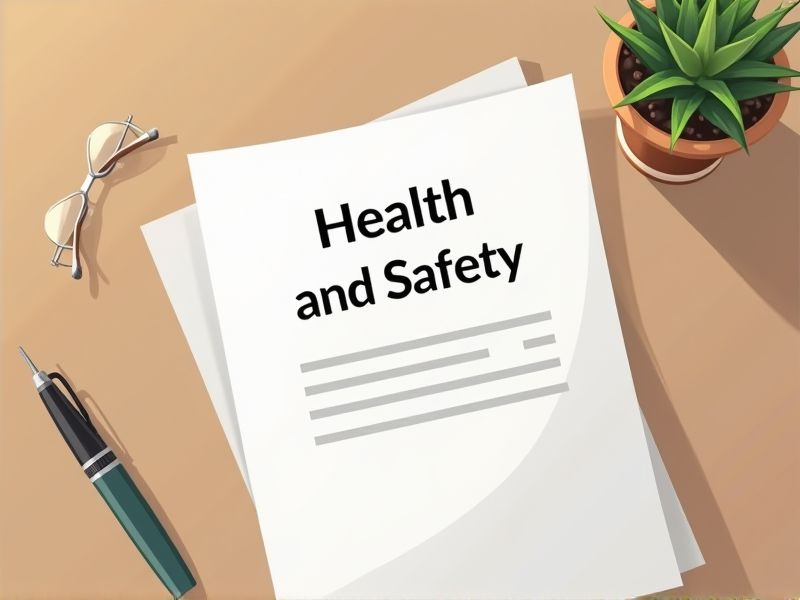
Health and Safety Officers play a critical role in ensuring safe working environments, where the absence of proper certifications can lead to increased workplace hazards and potential legal liabilities. Certain certifications validate an officer's competence and knowledge in adhering to regulatory safety standards which directly impacts the overall well-being of employees. Acquiring specialized certifications enhances an officer's ability to identify risks effectively and implement vital safety protocols. Consider these essential certifications you may need as a Health and Safety Officer.
Certified Safety Professional (CSP)
The Certified Safety Professional (CSP) credential enhances the credibility and perceived expertise of a Health and Safety Officer, often leading to increased trust from employers and coworkers. The certification provides a structured framework and advanced knowledge, ensuring the officer is equipped to identify and mitigate potential hazards effectively. By holding a CSP, a Health and Safety Officer is more likely to stay updated with current safety regulations and industry best practices, improving workplace safety outcomes. Data suggests that CSP-certified professionals tend to have higher earning potential and greater career advancement opportunities compared to those without the certification.
NEBOSH International General Certificate in Occupational Health and Safety
The NEBOSH International General Certificate provides foundational knowledge and skills crucial for ensuring workplace safety and compliance. Employers often prioritize candidates with this certification as it demonstrates a commitment to maintaining a safe working environment. The certificate enhances a Health and Safety Officer's ability to identify and mitigate potential hazards effectively. It also aligns with international safety standards, broadening employment opportunities across various industries and countries.
OSHA 30-Hour Training Certification
The OSHA 30-Hour Training Certification equips Health and Safety Officers with comprehensive knowledge of hazard identification and prevention, fostering a safer work environment. This certification facilitates compliance with regulatory standards, reducing the likelihood of workplace accidents and associated legal liabilities. Health and Safety Officers gain expertise in crafting safety programs, leading to enhanced organizational efficiency and reduced injury-related downtime. Possessing this certification often strengthens the credibility and qualifications of officers, appealing to employers prioritizing workplace safety.
Certified Industrial Hygienist (CIH)
A Certified Industrial Hygienist (CIH) plays a crucial role in identifying and assessing workplace hazards such as chemical exposures, ergonomics, and air quality issues. Their expertise ensures that health and safety officers implement effective control measures to mitigate potential risks and protect employee well-being. CIHs provide vital data and analysis that help in developing policies compliant with regulations, thereby reducing occupational illnesses and injuries. Their specialized knowledge supports continuous improvement of workplace safety programs, enhancing overall organizational health culture.
Occupational Health and Safety Technologist (OHST)
An Occupational Health and Safety Technologist (OHST) provides specialized knowledge that enhances the effectiveness of a Health and Safety Officer by addressing specific safety concerns through technical expertise. Certified OHSTs often possess advanced skills in risk assessment, which informs more comprehensive safety protocols. The OHST credential ensures that safety programs are up-to-date with current regulations, directly impacting legal compliance. Their technical background aids in the implementation of practical safety solutions, leading to reduced workplace incidents.
First Aid, CPR, and AED Certification
Health and Safety Officers are responsible for implementing safety protocols and providing immediate assistance during medical emergencies. First Aid, CPR, and AED certifications equip them with essential skills to stabilize and potentially save lives before professional medical help arrives. Having these certifications can reduce the severity of workplace injuries and ensure compliance with occupational safety regulations. Increased proficiency in emergency response enhances trust and confidence among employees, fostering a safer work environment.
ISO 45001 Lead Auditor Certification
ISO 45001 Lead Auditor Certification enhances a Health and Safety Officer's expertise in identifying workplace hazards and conducting effective risk assessments, leading to a safer work environment. This certification ensures that the officer is up-to-date with international safety standards, fostering global and local compliance. With this qualification, companies often notice a decrease in workplace incidents, improving overall employee well-being and productivity. Organizations value employees with this certification, as it indicates a reliable capacity for implementing and maintaining an effective safety management system.
Construction Safety and Health Technician (CSHT)
The presence of a Construction Safety and Health Technician (CSHT) enhances a Health and Safety Officer's ability to implement site-specific safety protocols effectively. With their specialized training, CSHTs provide vital support by identifying potential hazards and ensuring compliance with safety regulations. Their expertise contributes to reducing workplace accidents and improving overall safety performance on construction sites. Having a CSHT on the team leads to more thorough safety audits and risk assessments.
Certified Hazardous Materials Manager (CHMM)
A Certified Hazardous Materials Manager (CHMM) enhances a Health and Safety Officer's capability to effectively manage hazardous materials, ensuring compliance with safety regulations. This certification signifies advanced knowledge in environmental management, which minimizes risks associated with hazardous waste handling. A CHMM credential equips professionals with skills to develop and implement safety protocols, reducing workplace incidents. It also supports organizations in meeting legal and environmental responsibilities, preventing potential liabilities.
Emergency Response and Crisis Management Certification
Health and Safety Officers need Emergency Response and Crisis Management Certification because it equips them with the critical skills to efficiently handle unexpected situations, reducing potential harm. Certification ensures they understand legal and regulatory requirements, thus minimizing the risk of legal repercussions for the organization. With advanced crisis management training, officers can develop strategic plans that enhance workplace safety and resilience. Properly trained personnel significantly improve an organization's ability to recover from emergencies and maintain business continuity.
Summary
When you, as a Health and Safety Officer, obtain certifications, credibility and professional qualifications are significantly enhanced. This validation of expertise often leads to increased trust from both employers and employees. You can expect to have improved career prospects due to the perceived commitment to high safety standards. Furthermore, the organization may experience a reduction in workplace incidents, boosting overall productivity and morale.
